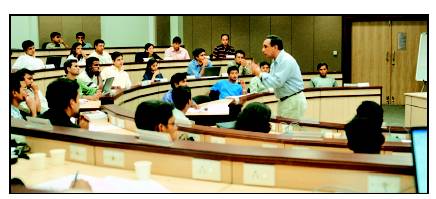“Why do you want to do an MBA?”
“I want to be an entrepreneur.”
“Do you need an MBA to become an entrepreneur?”
Even though I answered “Yes” with out any logical thinking, this question of my Professor Anirban Ghatak kept me thinking for the entire two years in MBA. Do you need an MBA to become an entrepreneur?
MBA – Masters in Business Administration – is different from entrepreneurship. To be specific, MBA is a subset of entrepreneurship. Entrepreneurship is more than that of MBA. The roles of a manager and an entrepreneur are not comparable. The approaches to the same problem by an MBA graduate and an entrepreneur are also different. The way they think(intuitive/ systematic), the decisions they make, idea generation methodologies, their dealing or presentation with other people, the risk taking abilities, and even their appearances and mannerisms are different.
An MBA graduate, usually, focus on one particular specialisation and even into micro specialisations. But an entrepreneur is a jack of all, and sometimes may be a master in one subject. There is no need of an MBA to start a business, but to proceed further, may be after a year, one needs some knowledge about managing the business. An entrepreneur can avoid this step by appointing a manager in the firm to take care of business. But would you prefer another person to run the business to you? Three things matter here.
Effectiveness: The entrepreneur has better information and knowledge regarding the business because he/she is the one who conceives the idea. And hence he/she can manage the business effectively and efficiently.
Trustworthiness: Since the entrepreneur knows the business inside out, it is better to take the position as a manager than appointing another person.
Money: You need to pay the manager a hefty amount if one is appointed.
An MBA is good when you need to understand more financial/marketing/HR concepts, otherwise there may be a chance that your own employees fool you and take advantage of your ignorance.
The critical factor: Idea
The critical factor that decides whether you need to do an MBA to become an entrepreneur or not is “idea”. If you have a very good ‘innovative idea’, do not waste your time in doing a two year MBA course. Start it right away. Get the help from a professional to make a business plan and present your idea before venture capitalists. They will take care of the funding part. But be cautious that the professional who is helping you to prepare the business plan should not steal your idea. (It is better to prepare a business plan by yourself or patent your idea).
But what if you do not have an innovative idea? An existing business or a successful idea copied from another country is prone to more competition. You need to know how to develop your business and here comes the importance of MBA. It depends on a number of external factors like economy, politics, technology etc. If you do not want to waste your time and have good financial backing, go ahead and hire a manager.
Decisions and risk-taking ability
An entrepreneur thinks both intuitively and logically more or less the same. But intuition plays a less role in the decision taking ability of a manager. Business schools will teach you to think in a systematic way just like solving a case study. But no one in business schools will teach you how to think intuitively. It is qualitative and is difficult to convey. One need to practice it. Keep in mind that intuition plays a major role in decision taking.
Entrepreneurs are more risk taking than managers. An entrepreneur identifies an opportunity and grabs it. He/she takes the risk and acts accordingly. But a manager is more into traditional way of thinking and hesitates to take the risk. Even if a manager do not take a risk and the business goes smoothly, he is not in a dangerous position. But if he takes risk and the business flops out of the risk, his may get a pink slip. This thought hesitates the managers to take risk. Always keep in mind that the risk should be a calculated one.
Learning: an on-going process
Whether you have an MBA or not, whether you plan to take an MBA or not, whether you are a manager or an entrepreneur, to run a busiess, it is essential that you need to learn continously. It is an on-going process.
Keep on updating your knowledge. Identify the opportunities, anaylse them – its advantages and drawbacks. If it is viable, take the risk and invest in it. Reap the benefit as soon as possible.
Read Full Post »


